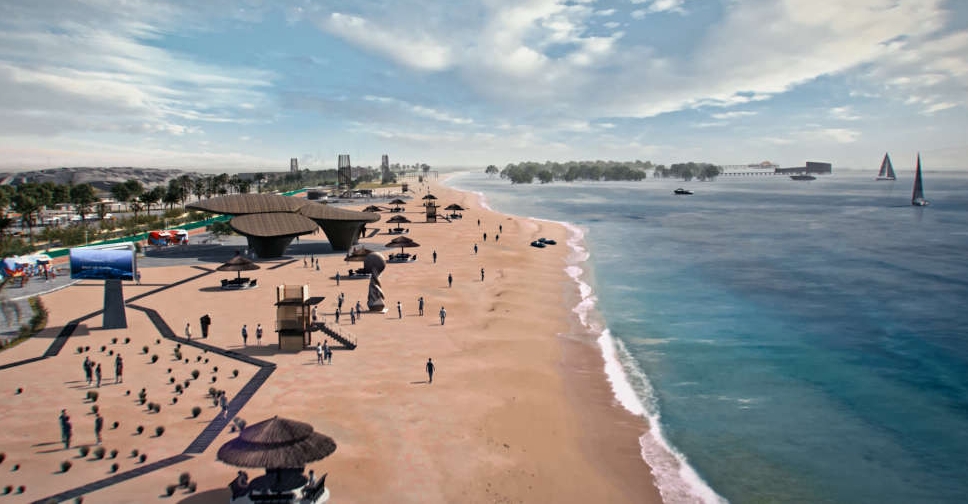
His Highness Sheikh Hamdan bin Mohammed bin Rashid Al Maktoum, Crown Prince of Dubai and Chairman of the Executive Council, has approved the master plan for the 6.6 kilometre development of Jebel Ali Beach.
The plan includes the development of two areas, the first is a five-kilometre sandy beach, which will be developed by Nakheel, and the second is the 1.6-kilometre-long Mangrove Beach, which will be developed by Dubai Municipality.
The beach will become a recreational destination with a unique environmental character in the emirate, taking into account the preservation of the ecosystems and wildlife on the site.
His Highness also approved the architectural designs of the buildings and facilities of the project, to suit various beach activities, while providing services, facilities and public amenities.
The plan includes allocating a two-kilometre-long open beach for swimming, a 2.5-kilometre diving area, a walkway and viewing platforms that allow integration with the surrounding environment, and recreational and service areas for beachgoers of all ages, including children’s play areas and areas for sports and marine activities. The beach will be linked to an integrated infrastructure, including the implementation of a two-lane street in each direction, parking lots with a capacity of 1,000 vehicles, 80 bicycle parking spaces, a bicycle path and a five-kilometre-long running path.
حمدان بن محمد يعتمد المخطط العام والتصاميم لتطوير شاطئ جبل علي بطول 6.6 كم وبمساحة كلية 330 هكتار، وذلك ضمن مستهدفات الخطة الشاملة لتطوير الشواطئ العامة في #دبي وزيادة أطوالها بنسبة 400%.https://t.co/0gCV4NxTOl pic.twitter.com/nXk2q6I5Yp
— Dubai Media Office (@DXBMediaOffice) July 7, 2024
His Highness said “Under the directives of His Highness Sheikh Mohammed bin Rashid Al Maktoum, Vice President and Prime Minister of the UAE and Ruler of Dubai, we are determined to implement the infrastructure and services, and provide multiple urban options for citizens, residents and visitors, including beaches, open spaces and recreational green spaces, to enhance the quality of life in the city, and for Dubai to be the best city to live in the world, providing a distinguished healthy environment for residents and visitors.”
He added, “The Jebel Ali Beach Development Project comes within the framework of the comprehensive plan to develop public beaches in the emirate, with the aim of increasing their length by 400 per cent by adding new public beaches and developing existing ones, and providing them with new recreational, sports, aesthetic and investment services and facilities, in line with the Dubai Urban Plan 2040.”
Mattar Al Tayer, Commissioner-General of Infrastructure, Urban Planning and Quality of Life, said the development “is the first of its kind in the country, an open beach for the public and a site of global environmental importance, as it is located within the Jebel Ali Wildlife Sanctuary, which is listed under the Ramsar Convention on Wetlands of International Importance.
“It aims to create a unique, attractive and environmentally friendly recreational beachfront that supports the emirate’s gains in the field of sustainability and sustainable ecotourism.”
He stressed that the development of the beach will be in a way that ensures the preservation and development of the site’s ecosystems and wildlife, by enhancing turtle habitats, and enhancing and increasing mangrove trees, which will contribute to increasing the blue carbon footprint, and providing an open environmental beach with minimal impact on environmental and biological systems.
His Excellency Mattar Al Tayer said, “The beach will be divided into three locations, the first of which is The Pearl, located on the right side of the development area near the entrance to Palm Jebel Ali. The location is a hub for beach and recreational activities, where beachgoers can choose between a lively family beach with sports activities, a swimming pool, and children’s play areas, in addition to a beach club that includes a swimming pool and a private beach for a fee, and several restaurants, cafes and shops, in addition to a floating restaurant in a distinguished location. The second location, called The Sanctuary, is a safe haven for turtles and natural habitats.
“The third site, called The Nest, is located within the mangrove area and is an educational entertainment destination that provides a mix of educational initiatives while preserving the environment. It includes an environmental centre for environmental studies and awareness in the field of biodiversity, and provides turtle treatment and rehabilitation programs.”
The centre will provide an opportunity for visitors to learn about the coastal ecosystem and help preserve it, as well as protect mangroves and other wildlife in the area.
